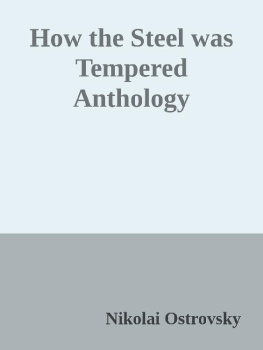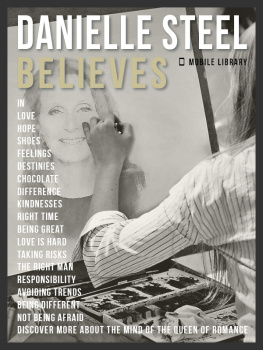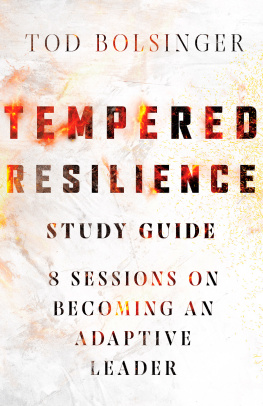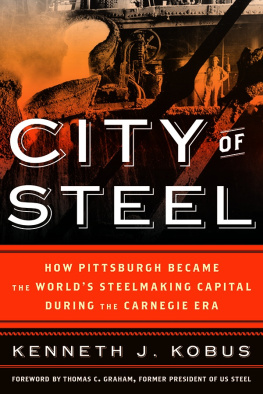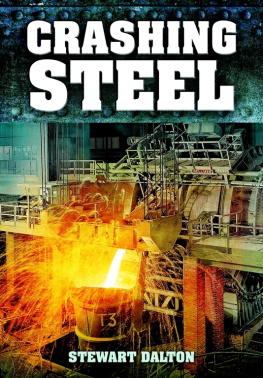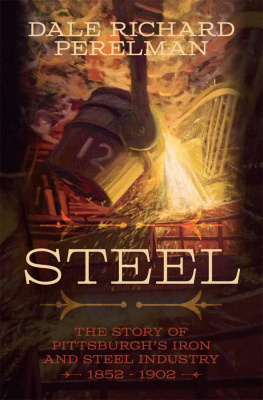Nikolai Ostrovsky - How the Steel was Tempered. Anthology
Here you can read online Nikolai Ostrovsky - How the Steel was Tempered. Anthology full text of the book (entire story) in english for free. Download pdf and epub, get meaning, cover and reviews about this ebook. year: 0, genre: Detective and thriller. Description of the work, (preface) as well as reviews are available. Best literature library LitArk.com created for fans of good reading and offers a wide selection of genres:
Romance novel
Science fiction
Adventure
Detective
Science
History
Home and family
Prose
Art
Politics
Computer
Non-fiction
Religion
Business
Children
Humor
Choose a favorite category and find really read worthwhile books. Enjoy immersion in the world of imagination, feel the emotions of the characters or learn something new for yourself, make an fascinating discovery.
- Book:How the Steel was Tempered. Anthology
- Author:
- Genre:
- Year:0
- Rating:5 / 5
- Favourites:Add to favourites
- Your mark:
- 100
- 1
- 2
- 3
- 4
- 5
How the Steel was Tempered. Anthology: summary, description and annotation
We offer to read an annotation, description, summary or preface (depends on what the author of the book "How the Steel was Tempered. Anthology" wrote himself). If you haven't found the necessary information about the book — write in the comments, we will try to find it.
How the Steel was Tempered. Anthology — read online for free the complete book (whole text) full work
Below is the text of the book, divided by pages. System saving the place of the last page read, allows you to conveniently read the book "How the Steel was Tempered. Anthology" online for free, without having to search again every time where you left off. Put a bookmark, and you can go to the page where you finished reading at any time.
Font size:
Interval:
Bookmark:
PROGRESS SOVIET AUTHORS LIBRARY
NIKOLAI OSTROVSKY
HOW THE STEEL WAS TEMPERED
A Novel in Two Parts
Translated from the Russian by R. Prokofieva
PROGRESS PUBLISHERS
MOSCOW
OCR: http://home.freeuk.com/russica2/
INTRODUCTION
The balcony door stood open, and the curtain stirred in the wind, filling out, rising reluctantly, and shrinking like a dipped sail. A crumpled towel left by someone on the radio made a white blur in the dusk. It looked like a white rabbit who had laid down its long ears preparing to jump.
I remembered that bright September morning in Sochi two years ago, the small house in Orekhovaya Street, the ripe, orange persimmons in the sunlit garden, the pleasant whitewashed room, and the dear face on the piled-up pillows.
The white rabbit nestled happily in the folds of the blanket as Nikolai's nervous fingers caressed its long, silky ears. Nikolai was laughing softly, and his gleaming teeth were as white as sugar. On the bedside table lay several big red apples, and their lovely smell filled the whole house. The white rabbit, comically twitching its soft ears, licked the gentle human hand with its small pink tongue.
*
I wanted to shut my eyes tight and see that hot September morning again, and the house filled with sunlight and apple fragrance. My thoughts refused to take a melancholy course, and my mind was still unable to grasp what had happened and tell itself that this was the irrevocable....
But reality asserted itself, and my eyes saw with ruthless clarity the face that had forever grown still. The last struggle for survival had sapped all his life juices, and dried him as a leaf is dried in a hot wind. It only spared his tall, handsome forehead, and his soft dark chestnut hair. This clear, dome-like brow rose above a small, wizened face. And one fancied that his creative imagination, infused with revolutionary ardour and an irrepressible interest in and love of life, was still working busily.... I placed my hand on his forehead. It was still warm and even moist, as though Nikolai was simply resting after his exciting exertion. The Order of Lenin twinkled uncannily on his sunken chest as if life were stirring in it, and one would see it rise in a soft sigh.
For three days, from morning till night, an endless stream of people of all ages filed past the bier which was literally submerged in flowers and wreaths.
Nikolai Ostrovsky continues to live not only in his books: he himself is a heroic image, and one of the strongest and most striking personalities of his epoch.
Fate treated him cruelly, depriving him of the power of sight and the use of his legs and arms. But he overpowered his physical infirmities, his incurable disease, weakness, grief and torpor, and victoriously asserted life, creative endeavour, and struggle. As an ardent singer of the Bolshevik youth, he sang his militant, joyous song of struggle and victory of socialism, and his voice, ringing with a beautiful, lyrical strength, resounded throughout the Soviet land and the whole world.
Away with melancholy recollections! Let us part with them, for death is the tax we must pay for the frailty of our physical being, and let us turn to the inexhaustible, powerful fount of life....
I went to see him on a cold, windy day in 1932, a typical day for early Moscow spring. He lived in Mertvy Pereulok (since renamed Nikolai Ostrovsky Pereulok Ed.).
The large flat was packed with tenants. It was noisy and crowded. People jostled you in the corridor, babies were howling, and someone was typing inexpertly in a far room, pecking at the keys with a woodpecker's persistence.
What a setup for a writer! Imagine working in that din! I knocked, and opened the door into Nikolai Ostrovsky's room.
A man, muffled up to his chin in blankets and shawls, was lying on the bed. The pillows were piled high, and I saw a mop of dark chestnut hair, a large, prominent forehead, and a thin, wan face that did not have a drop of colour in it.
The thin eyelids trembled slightly. The thick eyelashes cast bluish shadows on the hollow cheeks. Hands of a waxen transparency lay on top of the blankets.
I knew that Nikolai Ostrovsky was an invalid, but still I did not picture him quite like this.
He looked so terribly weak and helpless that I decided not to bother him and come back another time.
Just then a slight old lady walked briskly into the room. She had lively dark brown eyes, and her face was wreathed in smiles.
"Mother, who's there?" Nikolai suddenly asked in a voice that was somewhat hollow, but very young and not weak at all.
His mother told him my name.
"Oh! How nice," he said. "Come nearer, come here."
A beautiful white-toothed smile lighted up his face. Its every line seemed to glow with youthful eagerness and the joy of living. At first I fancied that his big, brown eyes also sparkled with animation. But in the next moment I realised that the sparkle came from the deep and rich colouring of the irises. Still, during our conversation I kept forgetting that he was blind, for there was so much concentration, attention and joviality in his radiant face.
We were talking about the first part of his novel How the Steel Was Tempered which had just been signed for publication in the magazine Molodaya Gvardia where I worked as editor at the time. Nikolai was curious to hear how his characters had impressed us.
"Pavel, I think, is not a bad kid at all," he said with sly humour, and flashed me a smile. "I'm not making a secret of it, of course, that Nikolai Ostrovsky and Pavel Korchagin are the closest of friends. He's made from my brain and my blood too, this Pavel person.... What I want to know is this: does my novel read simply as an autobiography, the story of just one life?"
His smile suddenly waned, and with his lips compressed, his face looked cold and stern.
"I've purposely put the question so bluntly because I want to know whether the thing I'm doing is good, right, and useful for people or not? There are lots of single cases that are interesting in themselves, but a reader will pause before one for a moment, as before a shopwindow, even in admiration perhaps, and then walk on his way, never again remembering what he had seen there. That is what every writer should fear most, and myself, a beginner, the more so."
I told him that he had nothing to fear on this score. He interrupted me gently and said: "Only please, let's agree on one thing: don't comfort me from the kindness of your heart. You don't have to sugar the pill for me. I'm a soldier, after all, I could sit a horse when I was a mere kid, and I won't be thrown off now."
Although his lips twitched and his smile was shy and gentle, the strength of his unbreakable will was suddenly revealed to me with the utmost clarity. At the same time I felt terribly happy that what I had to say to him would, in fact, comfort him.
I told him that as I read his book I involuntarily recalled the heroes from the Russian and western classics. Many of these heroes, created by writers of genius, shaped the will and the mentality of whole generations. For background they had the history of social relations, social and personal tragedies, and the glory of the peaks attained by human culture.
Pavel Korchagin could take a proud and confident stand among the great and the gloried. This young newcomer, emerging from the fires of the Civil War, should not feel self-conscious finding himself in such illustrious company. Nor did he have to go cap in hand begging for a place, even if only the smallest, in the literati gardens. He had something which the others had not: his young heart was possessed of an inexhaustible strength and throbbed with an unquenchable passion of struggle, and his mind was fired by the most progressive and noble thoughts of people's freedom and happiness.
Next pageFont size:
Interval:
Bookmark:
Similar books «How the Steel was Tempered. Anthology»
Look at similar books to How the Steel was Tempered. Anthology. We have selected literature similar in name and meaning in the hope of providing readers with more options to find new, interesting, not yet read works.
Discussion, reviews of the book How the Steel was Tempered. Anthology and just readers' own opinions. Leave your comments, write what you think about the work, its meaning or the main characters. Specify what exactly you liked and what you didn't like, and why you think so.

